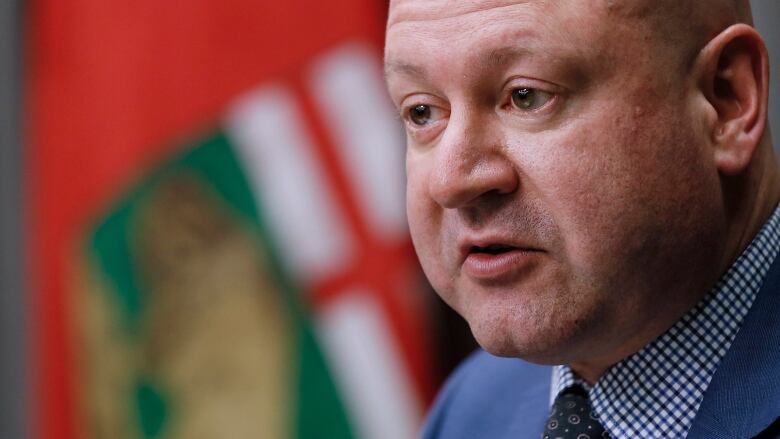COVID-19 numbers from provincial, First Nations data sharing agreement won't be made public without consent
Manitoba has been asking COVID-19 patients to self-identify as First Nations, Mtis or Inuit since April 3

Manitoba health officials have struck what they say is a first-of-its-kind agreement with First Nations leaders to track and share COVID-19 data, but the public may not seespecifics of what the unique agreement yields.
Manitoba started asking patients testing positive for COVID-19 to voluntarily self-identify if they are First Nations, Mtis or Inuit starting onApril 3, as part of an agreement negotiated between the province and a health committee under the Assembly of Manitoba Chiefs.
The data will be shared with First Nations leadership in the province to help those governments fight the spread of the disease, said Dr. Brent Roussin, Manitoba's chief provincial public health officer.
"This information sharing agreement is the first of its kind in Canada, and respects the principles of data ownership, control, access and possession and First Nations data sovereignty," Roussin said in a news release Tuesday.
Roussin has so far refused to share information collected under the agreement publicly. In multiple news conferences this week, Roussin said data won't be released unless First Nations groups give consent.
"We're working on a similar agreement with Inuit communities. We remain interested in connecting with representatives from the Mtis community to work on a similar agreement," Roussin said Thursday. "But in the meantime, there'd be no plans to release such data unless a formal agreement was in place."
Arlen Dumas, grand chief of the Assembly of Manitoba Chiefs, said that's as it should be. Data sharing is a matterof privacy, planning and data sovereignty of First Nations in the province, he says.
"It's not a matter of public information," Dumas said Tuesday. "It's an opportunity to create change in systems that historically work in isolation of each other."
Lessons from H1N1
So far, Manitoba has no documented cases of COVID-19 in First Nations communities.
If such acase was confirmed, Dumas said it would be up to that nation's leadership to decide whether to make the information public.
"Fundamentally, it should be up to the nation to decide how they want their information to be used."
Latest local news:
- Manitoba to spend $500M on infrastructure 'to restart economy'
- Cluster of Manitoba COVID-19 cases found at trucking company in Brandon, premier says
- Manitoba COVID-19 case drops by 1 after probable case ruled negative
The data sharing plan came out of a push by First Nations leadership and was negotiated between the province and the health information research governance committee under the Assembly of Manitoba Chiefs, as well as the First Nations Health and Social Secretariat of Manitoba.
Leona Star, director of research for the secretariat, said that push was driven by the need for First Nations governance to have ownership, access and control over First Nations data, to inform surveillance, programming and services for the pandemic.
"We're actually basing the direction as a result of the experiences during H1N1, where we [were] playing catch up," Star said Tuesday.
First Nations in Manitoba were among the hardest-hit communities in Canada by H1N1 in 2009, when 50 people were sickened and three died in Garden Hill First Nation alone.
The devastating toll of that illness has informed the quick response of Manitoba First Nations in the face of COVID-19, she said. Sixty-two of the province's 63 First Nations had declared local states of emergency by March 20 eight days after the province's first case Indigenous Services Canada said in March. Some set up roadblocks to keep visitors from bringing the coronavirus into their communities.
Garrison Settee, grand chief ofManitoba Keewatinowi Okimakanak, said unequal access to health-care services and remote locations, among other factors, mean First Nations leadership must be involved in health-care decision-making.
"We need to be a step ahead of the game all the time, because our people are most vulnerable and we need to be able to be proactive in everything that we do," he said.
Mtis, urbanorganizations not included
The agreement has, however, drawn criticism from the Manitoba Metis Federation, which was not included in the data sharing plan.
President David Chartrand said Thursday he was appalled the organization wasn't included, after he learnedabout the plan through media reports
Chartrand pointed to the toll the virus has taken in La Loche and northern Saskatchewan, where the Mtis NationSaskatchewan has declared a state of emergency, as an example of why it's essential Mtis leadership is involved in pandemic planning.
His organizationhas already put its own planning in place, but hasn't gotten any time at the table with provincial leadership.
"If you're not going to work with us, then what are you gathering the information for?" Chartrand said. "What are you going to use it for after the fact?"
Damon Johnston, president of the Aboriginal Council of Winnipeg, said his organization and other urban Indigenous groups weren't involved, either.
"I think it leaves a hole," he said. "In the cities it's the Indigenous charitable and not-for-profit organizations that are delivering most of the day-to-day programing and services to Indigenous individuals who live in Winnipeg."
Johnston praised the province's work on data collection, which he called essential, and plans to open a testing site at Winnipeg's Thunderbird House. That will help capture the virus's spread within the city's homeless population, he said, roughly 70 per cent of which is Indigenous.
But he hopes to see the province work with Indigenous groups in Winnipeg, to better use the know-how already within those organizations and serve the community better.
"You get better outcomes because of the cultural competency of these organizations working with their own people," he said.












_(720p).jpg)


 OFFICIAL HD MUSIC VIDEO.jpg)
.jpg)



























































































